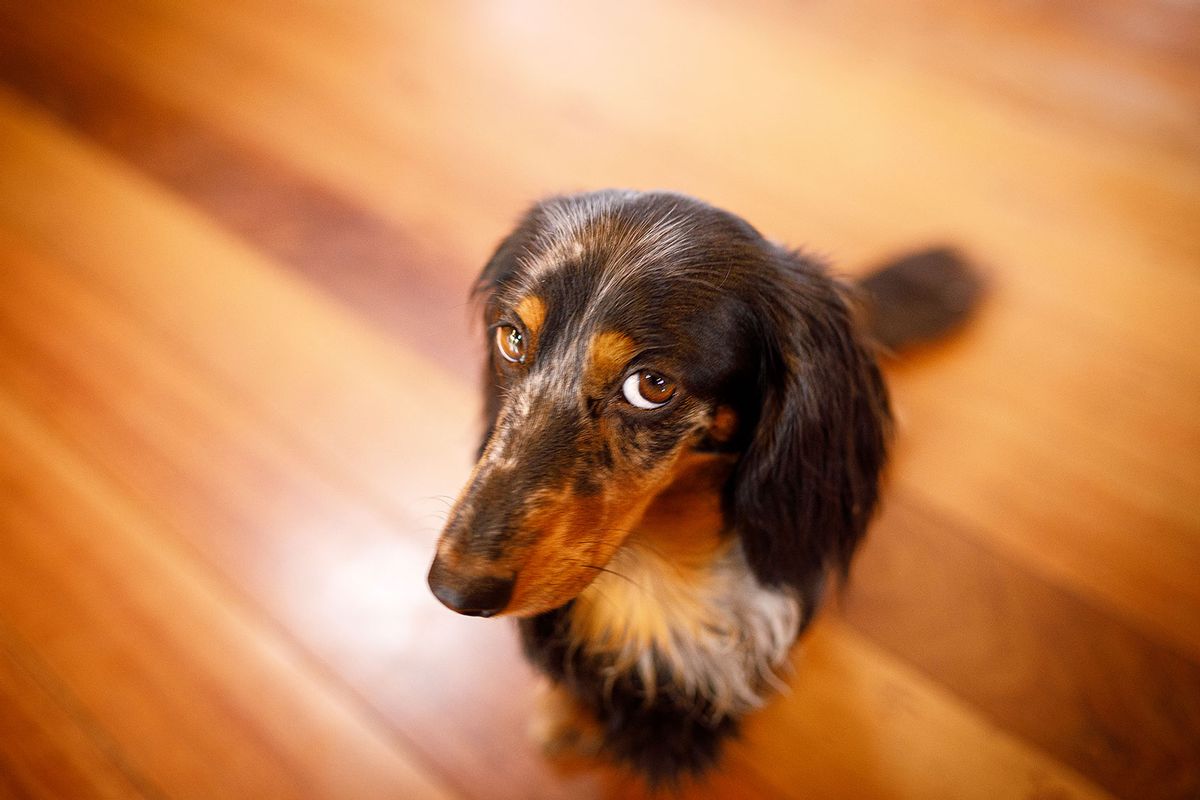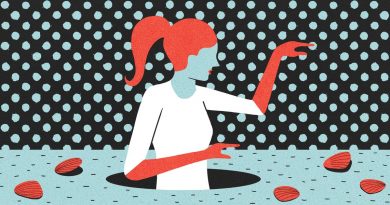Do animals feel shame or are they faking it? An expert unmasks what dogs and cats may really feel

Whether you’re a fan of dogs or not, chances are you’ve seen “dog shaming” online. It is the meme-able, viral trend of photographing one’s dog next to handwritten signs in which the pups “confess” to their real-life misdeeds. Such canine crimes include barking too loudly, biting strangers, eating remote controls, stealing cookies from children and peeing on a Virgin Mary statue. On each occasion, the presumption was that the dog expressed shame — or, at least, that’s what it looked like.
Yet do dogs actually feel shame — or are they just mirroring human emotions? What about other animals, for that matter? In 2018, The Atlantic published an article boldly titled “Your dog feels no shame,” with the author William Brennan reporting “the guilty look is likely a submissive response that has proved advantageous because it reduces conflict between dog and human.”
“I walked in and there was my favorite ski jacket on the floor ripped apart — on which he had peed.”
But Dr. Marc Bekoff thinks there’s much more to this relationship. Bekoff, professor emeritus of ecology and evolutionary biology at the University of Colorado, Boulder, has written extensively about the inner states of animals and is the author of the aptly-titled book “The Emotional Lives of Animals” and “Dogs Demystified: An A-to-Z Guide to All Things Canine.” He has also specifically delved into the question of whether dogs are capable of feeling guilt or shame, and is not afraid of being blunt in declaring his impassioned views on the subjects.
The following interview has been lightly edited for length and clarity.
I think that there is a moral implication when people use the word “shame,” which is anthropomorphizing, so I’m going to replace it with “embarrassment.” Can animals feel embarrassment based on what you have observed and based on the research you have read?
Yes, but I’m not sure that I would agree about, first of all, about what you said about “shame.” I’m not a fan of using the anthropomorphism card. I really mean that. I’ve written that.
“If we look at the situations in which we would say a human is feeling shame, there’s no reason to think that a non-human can’t also feel that emotion.”
Can they feel embarrassment? Yes. There are a number of really good stories about embarrassment. I did a book called “The Smile of a Dolphin” and Jane Goodall wrote a really cool essay about a chimpanzee who fell, basically looked around, shrugged it off and walked away as if nothing happened. I don’t see the moral implication to shame. In fact, one of the articles I just sent you has the word shame in the title.
Here’s my take on it: It’s really difficult to know, but if we look at the situations in which we would say a human is feeling shame, there’s no reason to think that a non-human can’t also feel that emotion. The classic examples that come are dogs and guilt, dogs and shame. We still don’t know, but from an evolutionary biology point of view, because I’m really an evolutionary biologist, it’s hard for me to imagine that social animals don’t have the capacity to feel shame.
I agree. Can you share any specific examples based on things you’ve observed?
Gosh, I have a lot of stories. In one of them, very simply, I came home once some time ago and my Malamute dog, who always ran to the front door and came and greeted me and jumped on me, instead when I came home slinked to the front door, tucked its tail, rolled over and looked at me. This was before I knew what happened.
I thought, “Wow, there’s something off here.” And I remember saying to my friend, the dog’s name was Moses, that Moses did something and he’s not feeling good about himself. And I walked in and there was my favorite ski jacket on the floor ripped apart — on which he had peed.
Want more health and science stories in your inbox? Subscribe to Salon’s weekly newsletter The Vulgar Scientist.
“Because I’m really an evolutionary biologist, it’s hard for me to imagine that social animals don’t have the capacity to feel shame.”
Do you think he was actually ashamed or was he manipulating you?
Oh, I don’t think he was manipulating me at all, to be honest with you. But because I am a scientist, I like all the alternative explanations. But that was the one and only time he ever did that. Ever.
Let me ask you, did this anecdote make it worth the damage to your jacket?
The jacket was history. And what I did was I gave it to him and it became part of his favorite bed. I just did because number one, the jacket was unrecoverable. And number two, I mean, you know, I really felt, and this is really some years ago, I felt that he was telling me he did something wrong. He was apologizing. Maybe he was ashamed.
That reminds me of a story of a friend, a local standup comedian named Nate Marks, who he has a cat named Salò, after the Italian movie. We were hanging out and Salò tried to jump from the couch to the table, but the cat was so fat that it missed the table and literally landed on its butt. It was fine, totally not injured, but its pride was definitely wounded because it stood up, looked at me, looked at Nate, and as we were laughing, ran out of the room. It was like a Garfield comic. Do you think Salò felt embarrassed?
Yes. I mean, that’s a very reasonable explanation. In other words, there are people who just say “No, dogs, cats, other animals can’t and don’t feel shame.” I’d rather keep the door open.
In this new book that just came out, “Dogs Demystified,” I actually have a section on that. It says, “Okay, it’s hard to know certain things, but there’s no reason to think the animal did not feel embarrassed or ashamed for falling over. And that was another example that I was going to use for, again, one of my dogs, because I’ve lived with a lot of dogs.
This one was running around and my take on the situation — and the people who were there — was he was running around, showing off. And then he ran right into a gate. He didn’t get hurt. He was outside. I lived in the mountains. The dog was running outside, turned around, ran into a closed gate.
What kind of dog was this? What was his name?
Oh, this would’ve been Jethro. And Jethro was a rescued mutt, Rottweiler-German Shepherd. He had been a street dog. He had been alone for a while. He was very street smart.
I’m hoping we can talk about some wildlife, not just pets.
“There’s no reason to think that animals who live in social groups haven’t evolved the same, if you will, menu of emotions that we have.”
Here’s a great one, because I studied coyotes for years, years ago in the Grand Teton National Park. There’s a common element here: They’re doing something that they wish other people or other animals didn’t see. It was a baby coyote, probably give or take three months old, who was running around frenetically, engaged in a zoomie, which is just this frenetic running around in circles. He was trying to get other coyotes, his little mates, to chase him. He ran onto a rock, jumped off it, fell and tripped and rolled over. The first thing he did was got up and looked around and then just walked away and ran immediately behind his little mates who he was trying to get to play with him.
The point being, once again, he got up and kind of looked around. Sure, it’s falsifiable. People can say, “Well, how do you know? Maybe they were shaking it off because they ran into something.” And once again, it’s not a question of if these animals have the capacity or display a certain emotion. It’s why it has evolved. And no one’s done this study, it would be hard to replicate, I think about this question that you’re asking all the time. Mainly because there’s no reason to think that animals who live in social groups haven’t evolved the same, if you will, menu of emotions that we have.
That is an excellent point. Do you think more generally there is a way to distinguish between which animals would be able to feel embarrassment and which animals would not be likely to have that emotional capacity? Because obviously, to be extreme, a paramecium probably doesn’t feel embarrassed, however, an orangutan does. So there’s clearly a line, and I’m asking, I guess, where is that line?
The reason I don’t want to draw it — and it’s a great question — is number one, because I’ve been doing this so long, it’s a moving target. Some years ago, in a highly controlled study, rat researchers discovered that rats have regrets about not doing some things. The reason I’m using that as an example, before that study, people would’ve thought you were a loon to think that rats can display regret of not having done something, like going for a certain food reward.
I would say like a paramecium or an amoeba likely doesn’t show shame or embarrassment. But it just wouldn’t surprise me to find out that among vertebrates it exists. And I think the problem you run into in research is some people close the door on that possibility, but we know for example there’s a whole burgeoning literature on reptiles. There are reptiles who are great caregivers, snake mothers who are great at maternal care. I would not want to draw the line, but I would expect that a paramecium or an earthworm, likely does not show shame or embarrassment or guilt.
My hypothesis would be that the need for socialization would probably be key in the capacity to feel embarrassed. Because animals that are more solitary do not have the context for shame or embarrassment. Animals that depend on others for interactions of really any kind would feel the need to develop a sense of self and a sense of others whose opinions of oneself matter. Does that make sense?
Yeah. Because you hit the point, because a couple of times I’ve said this talking about social animals, group-living animals. This is a great discussion because I actually have a second edition of my book, “The Emotional Lives of Animals,” coming out where I write about this, that sociality and living in social groups probably is key in the evolution of certain emotions.
But it would be wrong to think that animals who typically are not asocial don’t have that capacity. If they were to live in a social group, could shame or guilt or embarrassment emerge? I think what happens is that it’s probably in them somehow, but it may not be elicited when they’re living alone. You’re hitting an incredibly important point.
Read more
about dogs


